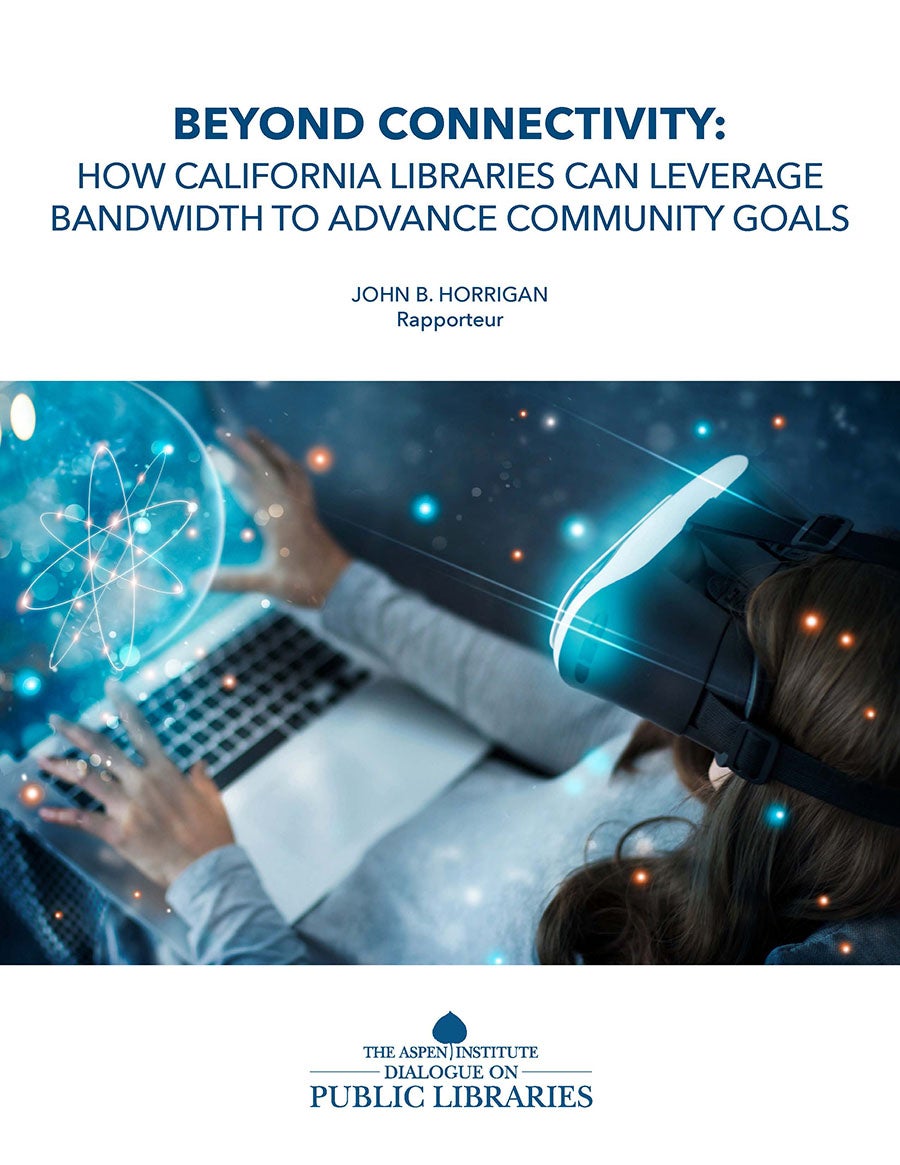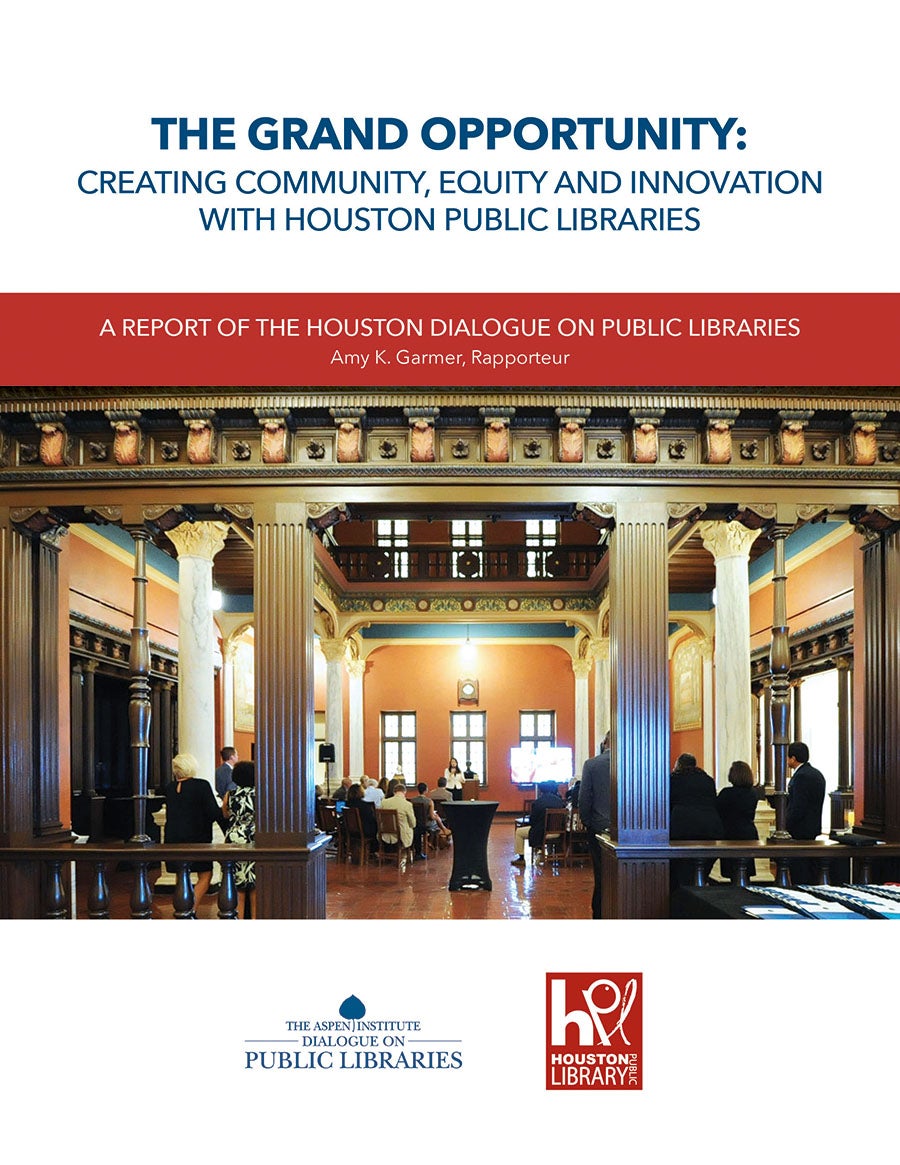The Aspen Institute Dialogue on Public Libraries is pleased to announce publication of Winter Park Rising to the Challenge: A Report of the Winter Park Library Dialogue. This report is the result of a collaboration with the Winter Park Public Library and is available on the Winter Park Public Library website at www.wppl.org/dialogue.
The Winter Park Library Dialogue is the first in a new series of dialogues across the country that are designed to spark new thinking and action to transform libraries for the 21st century. Winter Park, a city of approximately 28,000 residents that borders Orlando, was a natural partner for our first community dialogue in this series because of its insightful and innovative library leadership and the strong support and interest of community leaders from all sectors.
In his Foreword to the new report, Winter Park Mayor Steve Leary states how well-planned investments in public libraries can create a competitive advantage for the community:
“This report provides the beginning of a roadmap for Winter Park, and perhaps a blueprint for other communities who must reinvest in their assets to remain relevant in a hyper-dynamic marketplace wherein all municipalities are competing with one another to attract and retain the best and brightest residents, businesses and guests. …We should be bringing out of the ground an experiential library whose very design, as well as the opportunities within, inspires our community members to seek growth.”
Winter Park Rising to the Challenge discusses developments in technology, education and society that will shape the needs of the Winter Park community in the near term, and the opportunities these developments create for the library to deepen its engagement with and service to the community. The report highlights four key recommendations for action by the library and the community, with the report detailing how each recommendation can move forward to action.
- Create and communicate the new vision for the Winter Park Public Library.
- Define the public library as a community priority.
- Bring diverse expertise and financial and sustainable resources to partner with the library.
- Brand the library as a platform for community learning and development, collaborate with users, and define the scope of library programs and services.
Participants from the Dialogue are already working to implement specific recommendations in this report.
Earlier this week, members of the WPPL board of trustees and WPPL staff attended a workshop, hosted by Board of Trustees Chair Marina Nice and led by Professor Katie Tagyeof Valencia College’s Collaborative Design Center, to explore and develop a vision statement for the Winter Park Public Library (Recommendation #1 in the report). Upon completion of the visioning work, Stacey Johnson, President, East Campus, Valencia College, has committed to convene an inaugural Educators’ Roundtable in Winter Park (see “A Path Forward” section in the report). With its strong leadership and community support for the library, Winter Park is a valuable model for other communities interested in transforming their civic institutions.
The Aspen Institute and LibraryVision website will continue to share developments as progress continues in Winter Park, including resources from which other communities may gain insights and inspiration to advance their own community library dialogues. Winter Park is a valuable model for other communities interested in transforming their civic institutions.
Background on Winter Park, Florida and the Winter Park Library Dialogue
The Winter Park Public Library (WPPL) is an independent, 501(c)3 organization that serves residents and guests from a single, city-owned library building located near the government center. Shawn Shaffer, WPPL’s executive director, took over from her longtime predecessorRobert Melanson in 2013, arriving from the suburbs of Chicago. Shaffer has been recognized as a community leader by the Winter Park Chamber of Commerce and, in 2016, as one the 25 most influential people in the city by Winter Park Magazine. WPPL receives approximately one third of its operating funds through a grant from the city, and must raise the rest of its funds through a combination of fundraising activities and other grants.
Winter Park residents and civic leaders show strong support for the public library and its mission, in part because city residents have long placed high value on education and culture, but also because library staff have actively cultivated community support through the development of outreach, programming and services that foster good relationships in the community. The Winter Park Library Dialogue received support from elected officials, city managers, and leaders from local businesses, foundations, community service organizations and educational institutions. Those who participated in the Dialogue are listed at the front of the report.
We found the community to be very enthusiastic about exploring ways that the library can evolve to improve opportunities for learning, innovation, civic discourse and social connection in Winter Park. The Aspen Institute worked with a planning committee of local leaders to design a two-day event tailored to the unique interests and circumstances of Winter Park.
The Winter Park Dialogue included a public discussion on the first day that featured keynote presentations by Richard Adler, president of People & Technology and a distinguished fellow at the Institute for the Future, and John Bracken, Vice President for Media Innovation at the John S. and James L. Knight Foundation. A moderated roundtable discussion among 26 invited leaders from a variety of Winter Park’s educational, cultural and civic organizations, local government and businesses took place on the second day.
Many civic leaders and residents were already primed to be thinking about the library’s place in the city’s future because a city-appointed Library Task Force had conducted a two-year study to examine the need for upgrading current library facilities. The Task Force’s efforts culminated in a June 2015 report that recommended the construction of a new library-events center.
The City had also appointed a citywide Vision Steering Committee that voted to approve its final report for the city on June 9, 2016, the day of the dialogue leadership roundtable. The chairman and vice chairman of the Winter Park Vision Steering Committee participated in the library dialogue. The Vision Winter Park report, which will be used by the city as it updates its Comprehensive Plan, provided a valuable set of insights and data for the Dialogue’s discussions about aligning the library’s programs and services with community priorities and goals.

